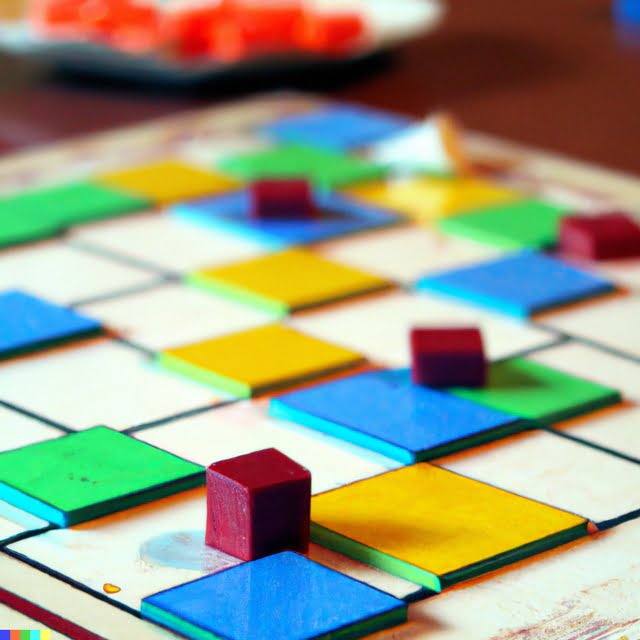Strategy deduction board games have been a popular pastime for centuries, providing players with the opportunity to engage in strategic thinking and deductive reasoning. These games require players to make calculated moves, anticipate their opponents’ actions, and use logic to outsmart their competition. In this article, we will explore the world of strategy deduction board games, including popular titles, the importance of strategy in these games, tactics for developing a winning strategy, and how they benefit different age groups.
As the demand for intellectually stimulating games continues to grow, strategy deduction board games have emerged as a favorite among enthusiasts of all ages. Players are drawn to the mental challenge these games offer, as they require careful planning and decision-making throughout each match. Whether it’s through cleverly deducing an opponent’s next move or strategically positioning game pieces on the board, these games provide a unique blend of entertainment and mental exercise.
Throughout this article, we will delve into various aspects of strategy deduction board games. From analyzing the role of psychology in gameplay to exploring how these games promote critical thinking skills development, readers will gain insight into the multifaceted nature of strategy deduction board games. Whether you’re new to these games or seeking to improve your skills, this comprehensive guide aims to provide valuable information on mastering strategic thinking in the world of board gaming.
Popular Strategy Deduction Board Games
Clue
One of the most iconic strategy deduction board games is Clue, where players must use deductive reasoning to figure out which character committed a murder, in which room, and with which weapon. The game involves making logical deductions based on the information provided and eliminating possibilities to ultimately solve the mystery. Clue has been a favorite among players for decades and continues to be a classic choice for those who enjoy using their critical thinking skills in a game setting.
Sherlock Holmes Consulting Detective
Sherlock Holmes Consulting Detective is another popular strategy deduction board game that immerses players in the world of solving crimes. This game challenges players to think like Sherlock Holmes by piecing together clues, visiting locations, and conducting interviews to solve cases. With its focus on deductive reasoning and problem-solving, this game offers an immersive experience for those who enjoy complex mysteries and strategic gameplay.
Scotland Yard
Scotland Yard is a strategy deduction board game that places players in the shoes of London detectives as they work together to track down the elusive criminal Mr. X. Using a combination of deductive reasoning and collaborative strategy, players must navigate the streets of London while Mr. X attempts to evade capture. The game requires teamwork and careful planning, making it an engaging choice for those who enjoy cooperative gameplay with a focus on deduction.
These popular strategy deduction board games offer unique experiences that challenge players to think critically, make strategic decisions, and use deductive reasoning to achieve victory. Whether solving a mystery or working together as detectives, these games provide entertainment while also honing important cognitive skills.
The Importance of Strategy in Deduction Board Games
Board games are more than just a form of entertainment; they often require players to think critically and use strategic planning in order to win. This is especially true for deduction board games, where the key to victory lies in being able to make logical deductions based on the information available. The importance of strategy in deduction board games cannot be overstated, as it is the cornerstone of success in these types of games.
When it comes to strategy deduction board games, players must be able to analyze the available information, make logical connections, and use deductive reasoning to come out on top. This requires a certain level of mental agility and critical thinking skills that can be honed through regular gameplay. Additionally, strategic thinking also helps players anticipate their opponents’ moves and plan their own accordingly.
In order to excel at strategy deduction board games, players need to employ various tactics and techniques that can give them an edge over their opponents. This may include keeping track of all information gathered throughout the game, using process of elimination to narrow down possibilities, and being able to adapt their strategy based on new information that arises.
Ultimately, developing a winning strategy in deduction board games requires a combination of analytical thinking, strategic planning, and quick decision-making skills.
- Strategies for Deduction Board Games
- Analyzing available information
- Making logical connections
- Employing deductive reasoning
- Importance of Mental Agility
- Critical thinking skills development
- Anticipating opponents’ moves
- Tactics for Winning
- Keeping track of information
- Using process of elimination
- Adapting strategy based on new information
How to Develop a Winning Strategy in Deduction Board Games
Developing a winning strategy in deduction board games is essential for achieving success and outwitting your opponents. Here are some key tactics and techniques to consider when developing your strategy:
1. Understand the objective: Before diving into a deduction board game, it’s crucial to understand the ultimate goal and objective of the game. Whether it’s to uncover hidden information, deduce the identity of a character, or outmaneuver your opponents, knowing the end goal will help shape your strategic approach.
2. Analyze patterns and clues: Pay close attention to patterns and clues within the game. Look for recurring themes or behaviors that could lead you to valuable deductions. Keeping track of this information can help you narrow down possibilities and make informed decisions as the game progresses.
3. Anticipate your opponent’s moves: Successful deduction board games often involve predicting and countering your opponent’s moves. Consider what information they may have, what their next move might be, and strategize accordingly.
By honing in on these strategies, players can better grasp the nuanced elements of deduction-based board games which are both challenging but rewarding experiences.
Overall, by incorporating these tactics into your gameplay approach, you can significantly improve your chances of developing a winning strategy in deduction board games while also enhancing critical thinking skills along the way.
Tactics and Techniques for Mastering Strategy Deduction Board Games
Observation and Analysis
In order to excel in strategy deduction board games, it is crucial to enhance your observation and analysis skills. Pay close attention to the moves of your opponents, as well as the patterns that may emerge during gameplay. By carefully observing and analyzing the board and the actions of the other players, you can begin to develop a deeper understanding of the game’s mechanics and potential strategies.
Logical Reasoning
Logical reasoning plays a major role in mastering strategy deduction board games. As you analyze the information available to you, be sure to apply sound logic when making decisions. Utilize deductive reasoning, where you work backward from the information presented to draw informed conclusions. By strengthening your logical reasoning skills, you can make more strategic moves that will ultimately lead you to victory.
Adaptability and Flexibility
An essential tactic for mastering strategy deduction board games is adaptability. The ability to adjust your strategy based on new information or unexpected developments during gameplay is vital. Be flexible in your approach, acknowledging that not all strategies will work in every situation. Being adaptable will allow you to stay ahead of your opponents and increase your chances of success.
By honing these tactics and techniques for mastering strategy deduction board games, players can improve their overall gameplay experience and become more competitive in this exciting genre of board games.
Overall, strategy deduction board games offer an excellent opportunity for individuals to enhance their critical thinking skills while enjoying a fun and intellectually stimulating activity. Whether played with friends or family, these games provide a platform for strategic thinking and decision-making that can benefit individuals of all ages.
Strategy Deduction Board Games for Different Age Groups
When it comes to strategy deduction board games, it’s important to consider the age of the players. Different age groups have different levels of cognitive abilities and attention spans, so game designers and parents need to take this into account when choosing the right game. For younger players, games that involve simple deduction and logic skills are best, while older players can handle more complex games with deeper strategy elements.
One popular strategy deduction board game for young children is “Guess Who?” This game helps kids develop deductive reasoning by asking yes or no questions to eliminate characters and guess the opponent’s character. It’s a great way to introduce young children to the concept of deduction in a fun and engaging manner.
For older kids and teenagers, “Clue” is a classic deduction board game that requires strategic thinking and logical reasoning. Players must move around the board, collecting clues and making deductions to solve the mystery. This game is not only entertaining but also helps develop critical thinking skills in older players.
| Age Group | Recommended Game |
|---|---|
| Young Children | Guess Who? |
| Older Kids and Teenagers | Clue |
Additionally, there are strategy deduction board games designed specifically for adults such as “Sherlock Holmes Consulting Detective.” This game challenges adult players to solve complex cases using deductive reasoning, critical thinking, and strategic planning. These types of games are perfect for adults who enjoy working through intricate puzzles and honing their analytical skills.
The Role of Psychology in Strategy Deduction Board Games
Psychology plays a crucial role in strategy deduction board games, as it involves understanding the minds and behaviors of other players. These types of games require players to think critically, analyze their opponents’ moves, and anticipate their next steps. This is where the psychological aspect comes into play, as players must use their understanding of human behavior to outsmart their opponents.
One key psychological aspect in strategy deduction board games is bluffing. Players often try to deceive their opponents by making them believe something that is not true. This calls for an understanding of how to read other players’ body language, facial expressions, and verbal cues to determine if they are bluffing or telling the truth.
Additionally, it involves using one’s own behavior to mislead opponents. Being able to control one’s emotions and display a poker face is also essential in these types of games.
Moreover, psychology also relates to game theory in strategy deduction board games. Game theory involves analyzing the decisions of players in strategic situations and predicting how they will act based on mathematical and psychological models. By applying game theory principles, players can gain insights into the possible moves of their opponents and develop effective strategies to counteract them.
| Psychological Aspect | Role |
|---|---|
| Bluffing | Deception and reading opponent’s cues |
| Game Theory | Analyzing decisions and predicting opponent’s moves |
Strategy Deduction Board Games and Critical Thinking Skills Development
Board games are not just a source of entertainment, but they also serve as a platform for the development of critical thinking skills. Strategy deduction board games, in particular, require players to use their logical reasoning, analysis, and problem-solving abilities to outsmart their opponents.
These games challenge players to think several steps ahead, anticipate their opponent’s moves, and adapt their strategy accordingly. As a result, strategy deduction board games are an excellent way to develop and enhance critical thinking skills in both children and adults.
One popular strategy deduction board game known for promoting critical thinking skills is “Clue.” In this game, players must use deductive reasoning to solve a murder mystery by gathering information and eliminating suspects, weapons, and rooms until they can uncover the truth. This process requires players to think critically about the clues they gather, make logical inferences, and analyze the implications of each piece of evidence.
Another example is “Codenames,” a word-based deduction game that challenges players to give one-word clues to help their teammates identify hidden words on a grid while avoiding the opposing team’s words and obstacles. Players must carefully consider their word choices and anticipate how their teammates will interpret the clues given to them. By doing so, they exercise their critical thinking skills by analyzing multiple potential meanings behind each clue before making a decision.
Additionally, classic strategy deduction board games such as “Chess” and “Mastermind” also play a significant role in developing critical thinking skills. The complex decision-making processes involved in these games require careful analysis of possible outcomes and strategic planning several moves ahead. As such, these games provide valuable opportunities for individuals of all ages to hone their critical thinking abilities while enjoying an intellectually stimulating activity.
Conclusion
As strategy deduction board games continue to grow in popularity, it is clear that these games have a lasting future ahead. The appeal of engaging in mentally stimulating challenges while also enjoying social interaction has contributed to the enduring allure of these games. With the ongoing development of new strategy deduction board games, as well as advancements in technology that offer digital versions and online play, there are abundant opportunities for the expansion and evolution of this genre.
The importance of strategy in deduction board games cannot be underestimated. Players must continuously adapt their thinking, anticipate their opponents’ moves, and make calculated decisions based on limited information. This level of mental acuity makes these games appealing to a wide range of age groups, from children developing critical thinking skills to adults looking for an intellectual challenge.
The intersection of psychology and strategy deduction board games introduces an intriguing dynamic that adds depth to the gaming experience. Understanding human behavior, cognitive biases, and decision-making processes can give players an edge in predicting their opponents’ actions and adjusting their own strategies accordingly.
As research into this field continues to expand, it presents exciting possibilities for further enhancing gameplay and providing new insights into human cognition. Ultimately, the future of strategy deduction board games looks promising as they continue to captivate players with their combination of intellectual stimulation and entertainment.
Frequently Asked Questions
What Are the Best Social Deduction Games?
Some of the best social deduction games include “The Resistance,” “One Night Ultimate Werewolf,” “Secret Hitler,” and “Avalon.” These games require players to use deduction and bluffing skills to uncover hidden roles or identities.
What Is an Example of Social Deduction Game?
One example of a social deduction game is “Werewolf” (also known as “Mafia”). In this game, players are secretly assigned roles as villagers or werewolves, with the villagers trying to eliminate the werewolves without being discovered, and the werewolves trying to eliminate the villagers.
What Is the Game of Deduction?
The game of deduction involves using logical reasoning and clues to come to a conclusion or solve a mystery. Whether it’s solving a crime in a murder mystery game or figuring out who is lying in a social deduction game, deduction involves analyzing information and making informed guesses based on the available evidence.

I love playing all kinds of games – from classics like Monopoly to modern favourites like Ticket to Ride.
I created this blog as a way to share my love of board games with others, and provide information on the latest releases and news in the industry.





